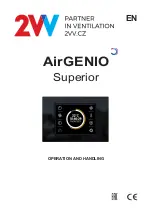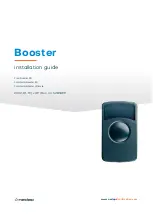
CAP.3
SICUREZZA
É estremamente importante leggere questo capitolo attenta-
mente ed in ogni sua parte poichè contiene importanti infor-
mazioni sui rischi che operatore e manutentore possono cor-
rere in caso di un uso errato del ponte sollevatore.
Nel testo che segue troverete chiare spiegazioni su alcune si-
tuazioni di rischio o pericolo che si possono verificare durante
l’uso e la manutenzione del sollevatore, sui dispositivi di sicu-
rezza adottati e sul loro uso corretto, sui rischi residui e sui
comportamenti da tenere (precauzioni generali e specifiche
per eliminarli o neutralizzarli).
I
ATTENZIONE:
I sollevatori sono stati progettati e costruiti per il
sollevamento e lo stazionamento in quota dei vei-
coli in ambiente chiuso. Ogni altro uso non è con-
sentito ed in particolare essi non sono idonei per
operazioni di:
- lavaggio e verniciatura;
- ponteggio o sollevamento di persone;
- pressa per schiacciare;
- montacarichi;
- CRIC per sollevare o cambiare ruote.
Il costruttore non risponde di alcun danno a per-
sone, veicoli od oggetti causati dall’uso improprio
o non consentito dei ponti sollevatori
In fase di salita o discesa l’operatore deve agire
soltanto dalla postazione di comando indicata in
Fig.19.
É vietato a chiunque sostare sotto le traverse e/o
le pedane in movimento o sostare entro la zona di
rischio indicata in Fig.19.
Si definisce come “ZONA DI RISCHIO” tutta l’area
occupata dal sollevatore comprensiva della fascia
perimetrale del sollevatore di larghezza 1÷2 mt.
Si definisce come “ZONA OPERATORE” l’area in
cui è prevista la sosta dell’operatore solo per
l’azionamento del sollevatore.
In fase di lavoro la presenza di persone sotto il
veicolo è ammessa soltanto quando il veicolo è
già sollevato, le traverse e le pedane sono ferme e
le sicurezze meccaniche (martelletti) sono inseri-
te nelle asole delle aste di sicurezza.
I
ATTENZIONE:
LA PRESENZA DI PERSONE SOTTO IL VEICOLO
SOLLEVATO E’ AMMESSA SOLTANTO QUANDO
IL SOLLEVATORE E’ IN STAZIONAMENTO SUI
MARTELLETTI DI SICUREZZA.
NON UTILIZZARE LA MACCHINA SENZA LE
PROTEZIONI O CON LE PROTEZIONI
DISATTIVATE.
IL MANCATO RISPETTO DI
QUESTE NORME PUO’ RE-
CARE GRAVI DANNI ALLE
PERSONE, AL SOLLEVA-
TORE ED AI VEICOLI SOL-
LEVATI.
Fig.19
CHAPTER 3
SAFETY
It is extremely important to read this chapter of the manual ca-
refully and from beginning to end as it contains important in-
formation regarding the risks the operator or maintenance fit-
ter may be exposed to if the lift is used incorrectly.
In the following text there are clear explanations regarding
certain situations of risk or danger that may arise during the
operation or maintenance of the lift, the safety devices instal-
led and the correct use of such systems, residual risks and
operative procedures to use (general and specific precautions
to eliminate potential hazards).
I
WARNING:
Lifts are designed and built to lift vehicles and
hold them in the elevated position in an enclosed
workshop. All other uses of the lifts are unautho-
rised. In particular, the lifts are not suitable for:
- washing and respray work;
- creating raised platforms for personnel or lifting personnel;
- use as a press for crushing purposes;
- use as elevator;
- use as a lift jack for lifting vehicle bodies or changing wheels.
The manufacturer is not liable for any injury to
persons or damage to vehicles and other property
caused by the incorrect and unauthorised use of
the lifts.
During lifting and lowering movements the opera-
tor must remain in the control station as defined
in figure 19.
The presence of persons beneath the cross-pie-
ces and/or the platforms when they are moving,
or the presence of persons inside the danger
zone indicated in figure 19 is strictly prohibited.
The area occupied from the lift and perimetral
band of width 1,5÷2 mt of the lift are defined as
"DANGER ZONE".
The operator parking area, only for actioning the
lift, is defined as "OPERATOR ZONE".
During operations persons are admitted to the
area beneath the vehicle only when the vehicle is
already in the elevated position, when the
cross-pieces and platforms are stationary, and
when the mechanical safety devices (wedges) are
firmly engaged in the slots on the safety rods.
I
WARNING:
THE PRESENCE OF PERSONS BENEATH THE
VEHICLE IS PERMITTED ONLY WHEN THE LIFT
IS IN THE PARKING POSITION ON THE SAFETY
WEDGES.
DO NOT USE THE LIFT WITHOUT PROTECTION
DEVICES OR WITH THE
PROTECTION DEVICES IN-
HIBITED.
FAILURE TO COMPLY
WITH THESE REGULA-
TIONS CAN CAUSE SE-
RIOUS INJURY TO PER-
SONS, AND IRREPARABLE
DAMAGE TO THE LIFT AND
THE VEHICLE BEING LIF-
TED.
16
Zona di rischio
Danger zone
Zona operatore
Operator zone
Summary of Contents for 442 LP
Page 1: ...I PONTE SOLLEVATORE A 4 COLONNE GB 4 POST LIFT 442 LP...
Page 2: ......
Page 13: ...SCHEMI ELETTRICI ED OLEODINAMICI WIRING DIAGRAMS AND HYDRAULIC 11...
Page 42: ...COLONNE POSTS S ULEN COLONNES COLUMNAS...
Page 43: ...TRAVERSE CROSSBEAMS TRAVERSE TRAVERSES TRAVERSA OS...
Page 44: ...PEDANE PLATFORMS FAHRSCHIENE CHEMINS DE ROULEMENT PLATAFORMAS...
Page 45: ...CILINDRO CYLINDER ZYLINDER V RIN CILINDRO...
Page 54: ......
















































